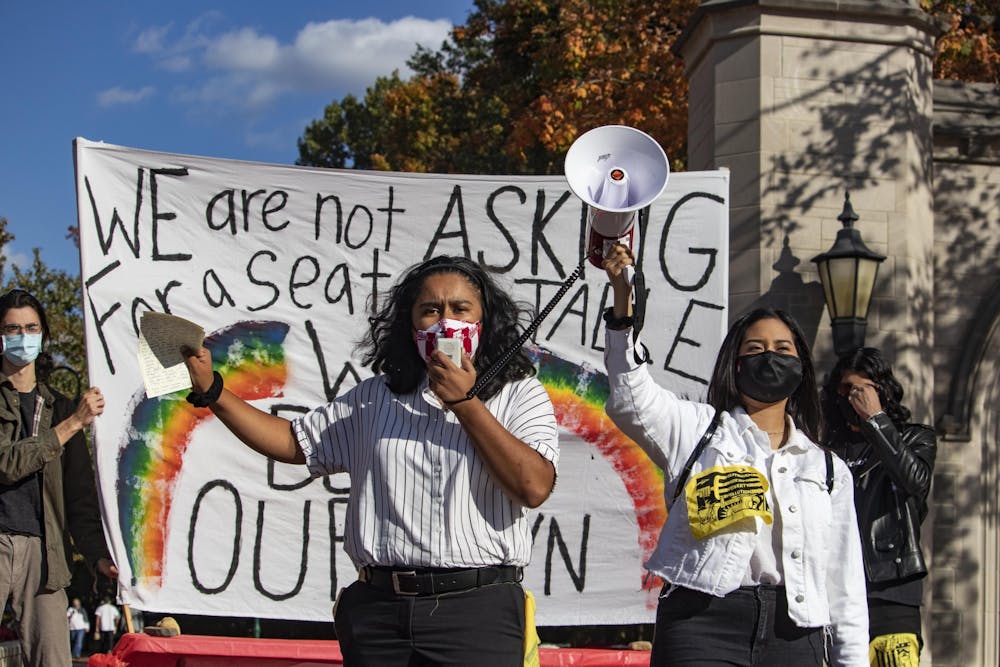In light of the Unite to Ignite rally on Oct. 16 led by members of the Rainbow Coalition, an organization of several multicultural groups on campus demanding representation for underrepresented students, IU Student Government vowed to represent marginalized students. But have they addressed their past wrongdoings?
The Rainbow Coalition has three basic demands for IUSG: representation, transparency and hazard pay for resident assistants.
Instead of using funding to provide COVID-19 relief specifically for resident assistants, IUSG has allocated money to pay stipends to IUSG members. The president and vice president could each rake in $3,000 a year. The recent IU Supreme Court nominations, which many students, including myself, were unaware of, shows the continued lack of transparency IUSG has with the student body. These issues are not mutually exclusive to one branch of IUSG but rather affect all three branches.
It is crucial IUSG begins to address the several problems pointed out by the Rainbow Coalition and make changes. The student government has been complicit in denying representation to already marginalized groups here at IU, yet their past actions have been kept relatively shielded from the student body.
It is time to change that.
During the summer, several congressional members proposed an “equal opportunity” amendment that would have allowed student organizations that represent a particular ethnicity, culture, nationality, gender or sexuality to appoint a representative as a voting member in the IUSG Congress. This legislation would have given more representation to underrepresented students by guaranteeing seats to multicultural centers. The amendment never made it out of committee and onto the floor for a vote.
Representation and transparency in the Supreme Court is another cause for concern. Only three cultural centers — the Asian Culture Center, the LGBTQ+ Culture Center and the Neal-Marshall Black Culture Center — were represented in the nomination committee.
Thomas Rainbolt, a student leader at the LGBTQ+ Culture Center, served on the Supreme Court Nomination Selection Committee. He said that many people who served on the committee already had ties to IUSG, which could have allowed bias into the selection process. Additionally, not everyone on the committee was even allowed to interview the applicants.
“As someone on the committee, it was kind of mystifying how dense and strange the process was,” Rainbolt said. “We didn’t talk to the finalists, we were given some vague and honestly biased information about how the interviews went. And then some of the people in those interviews gave their thoughts.”
According to Rainbolt, the racial identities and sexual orientations of each applicant was not mentioned throughout the entire process, which could indicate that seeking out justices to represent marginalized students was not a priority for IUSG.
“I think that they should have gotten input from diverse leaders or students in general earlier on in the process,” Rainbolt said.
One of the Supreme Court nominees, Landon Muzzillo, wrote an opinion column for the Indiana Daily Student in 2018 in defense of United States Immigration and Customs Enforcement. In his column, he defended ICE agents for arresting Joel Arrona-Lara, an undocumented immigrant who was driving Maria del Carmen Venegas, his pregnant wife, to the hospital to deliver their baby. Venegas was forced to drive to the hospital herself after her husband was detained.
Muzzillo called the outrage caused by the arrest “unnecessary” because the couple has been living in the United States for more than a decade without a green card. While everyone is entitled to their opinion on undocumented immigration, it is important to note that the nature of Arrona-Lara’s arrest was not a black and white issue. ICE agents disregarded the well-being of Venegas and her unborn child, a fact that Muzzillo refused to acknowledge in his column.
A nominee for one of the highest positions in IUSG who believes the letter of the law is always superior to any detrimental circumstance is dangerous for our student body. We need justices who are advocates for students, some of whom may be undocumented themselves.
Student Body President Rachel Aranyi, who is responsible for nominating candidates to the Supreme Court, did not respond to my request for an interview on this topic.
Furthermore, IUSG is funded by the mandatory student activity fee, a fee all students must pay calculated based on their total enrolled hours. The way that IUSG spends this money is problematic. For this school year, IUSG has set aside $25,500 for communications and marketing. Only $30,000 has been set aside for COVID-19 assistance, a mere $4,500 more than what they will spend on marketing and promotional purposes.
It is nonsensical that IUSG is spending 15% of the budget on communications, especially considering the fact that social media is free and can be used as an effective tool for marketing. Students who are struggling financially due to the pandemic would have benefitted if IUSG had allocated less money towards marketing and more towards COVID-19 relief.
In order for IUSG to take the first step toward implementing representation, transparency and allocating money based on students’ needs, they must address how their past actions were complicit in holding back progress at IU.
They must involve the perspectives of cultural centers and voices of students in decision making processes. Executive members and congressional representatives of IUSG have open meetings, town halls and office hours that are available for students to talk to their representatives at. I encourage everyone to pressure IUSG to meet these reasonable demands.
Rama Sardar (she/her) is a freshman studying media and filmmaking. She aspires to become a film director and a screenwriter.






